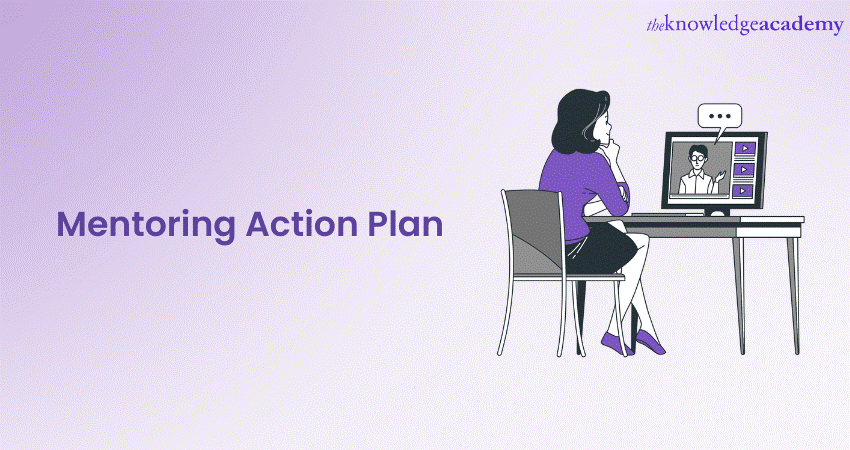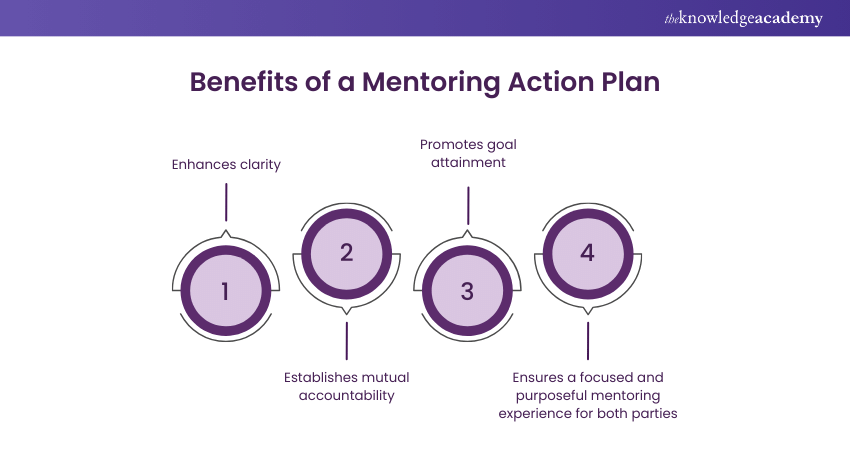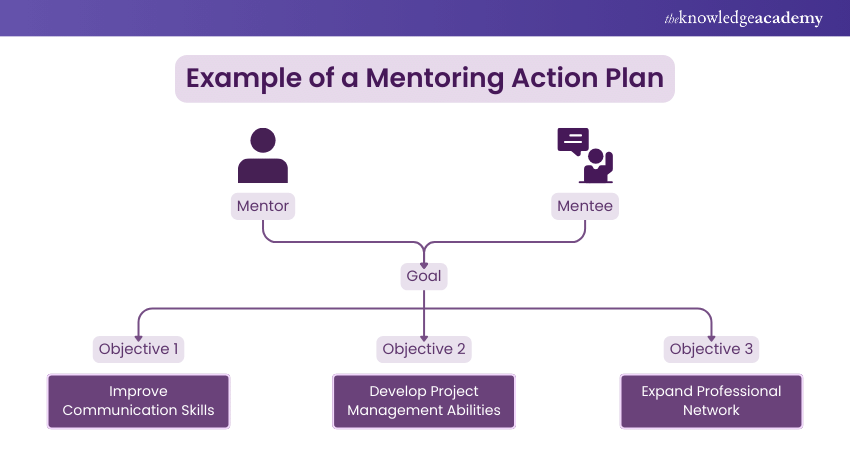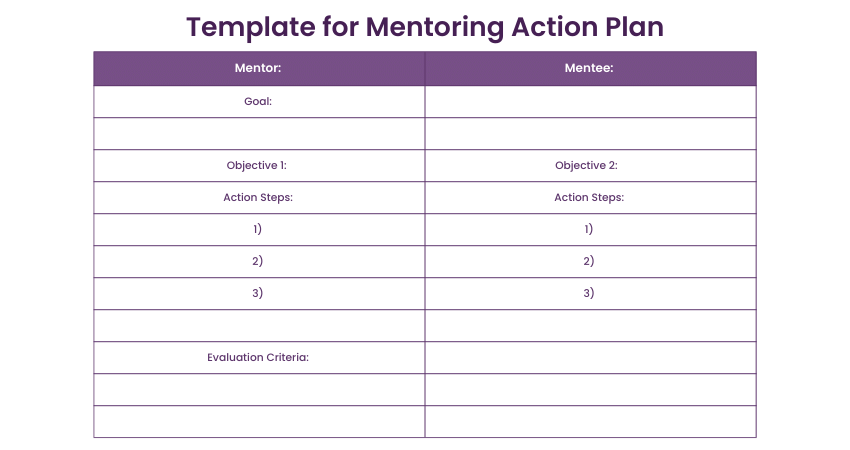
Dive into the realm of crafting a Mentoring Action Plan with our comprehensive resource. This blog provides tips for seamless implementation and regular reviews of your action plan to ensure it stays on track. Empower your mentoring journey with our guidance and templates, and take a step closer to successful mentorship.
Home Resources Business Skills Mentoring Action Plan: Guidance & Templates
Train the Trainer Top Rated Course
Exclusive 40% OFF
Enquire Now Download curriclumWe ensure quality, budget-alignment, and timely delivery by our expert instructors.

-->

A Mentoring Action Plan is a strategic roadmap outlining clear steps to foster professional growth and knowledge transfer between Mentors and Mentees. As the bedrock of successful Mentorship, this plan ensures both parties align on objectives, expectations, and timelines.
The Mentoring Action Plan guarantees continual progress and adaptation by establishing measurable goals and regular check-ins. It not only strengthens the bond between participants but also ensures the Mentee acquires relevant skills and insights, thus maximizing the benefits of the Mentoring relationship. Understanding the Types of Mentoring can further tailor the action plan to fit the specific needs and goals of the Mentee. Read this blog to learn about Mentoring Action Plan, its components, and how to develop an action plan, along with some useful tips.
Table of Contents
1) Understanding the Mentoring Action Plan
2) Components of a Mentoring Action Plan
3) Developing an effective action plan for Mentoring
4) Tips for implementing and reviewing the action plan
A Mentoring Action Plan serves as a roadmap for the Mentoring journey, outlining the objectives and strategies to be pursued by both the Mentor and Mentee. It provides a framework for regular communication, goal setting, and progress tracking. The Role of a Mentor is crucial in guiding the development and implementation of the action plan, offering insights, support, and accountability to ensure the mentee's growth and success. Let's take a look at some of its benefits.

Implementing a Mentoring Action Plan offers several advantages. Here are some benefits of a Mentoring plan:
a) Enhances clarity
b) Establishes mutual accountability
c) Promotes goal attainment
d) Ensures a focused and purposeful mentoring experience for both parties
The Mentoring plan also serves as a reference point, guiding mentors and mentees throughout their relationship.

A Mentoring plan typically consists of various components that contribute to its effectiveness. Its two essential components are the Mentoring Action Plan Example and the Mentoring Action Plan Template. Let's take a look at them below:
In order to provide you with a clear understanding of a Mentoring Action Plan, let's explore an example that demonstrates how it can be structured. Remember, the plan's specifics will vary based on the individuals involved and their unique goals and objectives. Here is a sample Mentoring plan:

Mentor: John Smith
Mentee: Emily Johnson
Goal: Enhance Emily's leadership skills and support her career development within the company.
Objective 1: Improve Communication Skills
Action Steps:
a) Attend a communication skills workshop together
b) Engage in regular one-on-one meetings to discuss communication challenges and progress
c) Provide feedback and guidance on improving verbal and written communication
Objective 2: Develop Project Management Abilities
Action Steps:
a) Assign Emily a project to manage under the Mentor's guidance
b) Conduct regular progress reviews and offer guidance on project management best practices
c) Provide resources and tools for effective project planning, execution, and evaluation
Objective 3: Expand Professional Network
Action Steps:
a) Introduce Emily to relevant industry events, conferences, and networking opportunities
b) Share personal contacts within the industry for potential Mentoring or collaboration
c) Assist Emily in creating an online professional presence through social media platforms
Evaluation Criteria:
a) Quarterly evaluations to assess progress toward objectives and make adjustments if necessary. Measure improvements in communication skills through feedback from colleagues and supervisors.
b) Evaluate successful project completions and the application of project management principles.
c) Monitor Emily's expanded professional network and connections made within the industry.
d) Assess leadership growth based on feedback from team members and observations of leadership qualities.
e) Review the alignment of short-term achievements with long-term career goals.
Remember, this Mentoring plan is just an example to illustrate the structure and components of a Mentoring Plan. Actual plans will be tailored to the Mentor-Mentee relationship's specific needs, goals, and dynamics.
A Mentoring Action Plan Template is a customisable framework for Mentors and Mentees to create their plans. The Mentoring plan template includes sections to outline goals, action steps, milestones, and evaluation criteria. It simplifies the process of developing a comprehensive action plan. Here is a Mentoring plan template that you can use as a starting point:

In order to develop an effective Mentoring plan, Mentors and Mentees should follow a step-by-step process. This section will outline the key steps involved in creating a Mentoring Action Plan. Here is the step-by-step guide to creating a Mentoring plan:
a) Define objectives: Mentors and Mentees should clearly define their goals and expectations for the Mentoring relationship. This step ensures alignment and establishes a shared vision.
b) Identify action steps: Break down the objectives into actionable steps. Determine the specific tasks, timelines, and responsibilities for each action step.
c) Set milestones: Define milestones to track progress and celebrate achievements. Milestones provide motivation and allow Mentors and Mentees to assess their development.
d) Establish evaluation criteria: Determine how the success of the Mentoring relationship will be evaluated. Define measurable criteria to assess the attainment of goals.
e) Communication plan: Establish a communication plan outlining the frequency and communication mode between the Mentor and Mentee. Clear and regular communication is vital for a successful Mentoring relationship.
f) Review and adjust: Regularly review the action plan, assess progress, and make adjustments as needed. Flexibility is essential to accommodate changing circumstances or evolving goals.
Get familiarised with effective coaching by signing up for our Coaching Skills Course now!
Implementing and reviewing the Mentoring Action Plan is crucial for a successful Mentoring relationship. Consider the following tips:
a) Maintain open and honest communication throughout the Mentoring journey.
b) Regularly assess progress against the established milestones.
c) Seek feedback from both the Mentor and Mentee to identify areas of improvement.
d) Adjust the action plan if necessary to ensure it is aligned with the changing needs and goals of the Mentor and Mentee.
Ready to level up your skills and unlock your full potential? Enroll now in our Mentoring Training Course and embark on a transformative learning journey!
We hope you read and understand everything about Mentoring Action Plan. It is an invaluable tool for structuring and optimising Mentor-Mentee relationships. By providing a clear roadmap and establishing mutual goals, the plan enhances the effectiveness and productivity of the Mentoring experience.
Empower others and drive transformational growth with our Coaching And Mentoring Skills Training – Sign up today!
The five steps of Mentoring include promoting the program, recruiting mentors and mentees, matching pairs based on criteria, guiding the mentorship with resources, and concluding the mentorship effectively.
What are the Golden Rules of Mentoring?The golden rules of Mentoring emphasise tailoring the mentorship to individual needs, understanding the mentee’s goals, keeping them accountable and providing constructive feedback.
What are the Other Resources and Offers Provided by The Knowledge Academy?The Knowledge Academy takes global learning to new heights, offering over 30,000 online courses across 490+ locations in 220 countries. This expansive reach ensures accessibility and convenience for learners worldwide.
Alongside our diverse Online Course Catalogue, encompassing 17 major categories, we go the extra mile by providing a plethora of free educational Online Resources like News updates, Blogs, videos, webinars, and interview questions. Tailoring learning experiences further, professionals can maximise value with customisable Course Bundles of TKA.
What is the Knowledge Pass, and How Does it Work?The Knowledge Academy’s Knowledge Pass, a prepaid voucher, adds another layer of flexibility, allowing course bookings over a 12-month period. Join us on a journey where education knows no bounds.
What are Related Courses and Blogs Provided by The Knowledge Academy?The Knowledge Academy offers various Train the Trainer Courses, including the Coaching Skills Training, Mentoring Training and Train the Trainer Course. These courses cater to different skill levels, providing comprehensive insights into Business Mentor.
Our Business Skills Blogs cover a range of topics related to Mentoring, offering valuable resources, best practices, and industry insights. Whether you are a beginner or looking to advance your mentoring skills, The Knowledge Academy's diverse courses and informative blogs have got you covered.